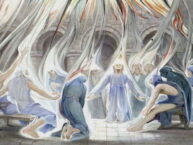 February 26, 2023: May God’s words be spoken, may God’s words be heard. Amen.
February 26, 2023: May God’s words be spoken, may God’s words be heard. Amen.
On Friday, a friend and colleague, the Very Reverend Patrick Malloy, Dean of the Cathedral of St. John the Divine, posted on his Facebook page a notice. Part of it read “…We have learned that tomorrow, [the 25th of February], has been declared a “National Day of Hate” by groups of antisemitic white nationalist organizations. This comes just days after a group of neo-Nazis heckled theater goers as they queued for a performance of the Broadway play, “Parade.” [The play] is about the wrongful rape conviction of Leo Frank, a Jewish man, in 1915. The hecklers asserted that he was, in fact, guilty as all Jews are guilty.” Dean Malloy went on to ask for solidarity with our Jewish sisters and brothers, and prayers for all.
After reaching out, again, to Rabbi Katz of Temple Ner Tamid here in Bloomfield to see how we might be of help, and assuring him that we stand with them, I began to think yesterday, on that so called “day of hate,” about the texts for this morning as I prepared this sermon – especially the story of Genesis and the Gospel.
Both of these texts are very familiar, so we sometimes can gloss over them – not really listening to what is happening, or to the context of the story itself. But we need to really pay attention, because what these scriptures are about can help us to understand our world today, and what we are called to do in our lives in Christ.
Taking the Genesis story first because, well, it is the first book and our biblical canon, and the first of our texts today, we get the story of the temptation of Adam and Eve in the garden. And to be clear, it was both of them in this metaphorical tale about our beginnings on earth. While I have altered the text we read in church to make this fact more clear: even the unamended translation we read says it too, though most people don’t pay attention to it. It reads, “She took of its fruit and ate; and she also gave some to her husband, who was with her, and he ate.” So, not for nothin’, Adam is equally at fault here. Yet when God comes walking around, the first thing Adam does is point the finger at Eve, and said “She made me do it!” Weeny.
Anyway, once they come to eat of the tree of knowledge, their eyes were opened to what is good and what is evil. Now, just to side with the serpent for a moment – he was right – they didn’t die. At least not physically. And not for nothing, but why exactly would having knowledge of good and evil be a bad thing? Well, if it doesn’t also include the wisdom of who we truly are and what that means for us and for the world, then there is a danger in that knowledge. Which brings us to the gospel lesson.
The first thing to note is that the Holy Spirit KNEW what would happen to Jesus – this was a purposeful act. The text opens with “Jesus was led up by the Spirit into the wilderness to be tempted by the devil.” This on the heels of God saying “There’s my boy – my beloved” as he is rising out of the waters of his baptism in the Jordan by John. Now this? Jesus might rightly say “Gee, dad – thanks for the playdate with the devil!”
And after being led there by the Holy Spirit, he encounters what our translation calls the tempter. The Greek word is διάβολος, which means “literally someone who “casts through,”… making charges that bring down or destroy.” Now, why on earth, or heaven for that matter, would God want to do that to God’s own son? Not to mention all the trinitarian hoops you can move through in this scenario – if it’s the Spirit, it is also Jesus, it is also God, so who is doing what really?
Anyway, it’s for the same reason God put that alluring tree of knowledge smack dab in the middle of that garden where Adam and Eve would be sure to be tempted by it.
The thing is, both of these stories are about identity and what that knowledge, or lack of it, can mean for us. The real impact of eating the fruit of that tree was as much a forgetting than a getting of any type of knowledge. These first humans forgot who they were – made in the image of God. When their proverbial eyes were opened after eating the fruit they saw only their humanity – and with that, a sense of inadequacy born of an inability to see that we are beloved children of God. And that can tempt one to seek to fill the gaping hole in their heart with things that will destroy them from within – usually without realizing it is happening.
Which is why it is good that this is paired with the Mathew text. While the children of God in the Garden went from having no knowledge of their human side, to forgetting their divine origins, Jesus knew exactly who he was, and the fully divine part of Jesus was purposely put into an internal battle with his fully human side – would he remember the fullness of his identity? The key to understanding what is going on in either of these two stories is to know that the battle isn’t between some external force like a serpent or a devil – but something deep within each of us.
God became incarnate that humanity might truly remember who they were and how deeply they are loved, not to do neat parlor tricks to bring the masses to their knees. So, Jesus is led into the wilderness where he self-stresses through fasting in that desolate environment to try to bring on what happens to all humans – the vulnerability, fear, and doubt that comes into our hearts in our darkest moments. Would he in his weakened state forget that he was God’s beloved?
In a sense, it was almost like a repeat of that garden moment, only this time God was trying to experience fully what it means to be human, or really, human without any knowledge of our divine nature as children of God. And I think it helped Jesus in his ministry with us too. It gave him insight into our fully human nature, and what draws us out of relationship with God.
Jesus needed this, and so do we. No, we don’t have to head out on a road trip to the desert and fast for 40 days. Instead, we have Lent – our time in the wilderness to face our own demons. And strangely enough, the temptations we have are not too far off from the ones Jesus was offered in the desert:
The temptation to think we are all we need to provide for ourselves.
The temptation to have power, or use power unwisely.
The temptation to make God in our image.
And it is that last one that was brought to my mind by this National Day of Hate. I mean – first of all – who the hell thinks a day devoted to hate is a good thing? Sadly, far too many people. And if we look at these so-called white nationalists, we will find that many them claim a Christian identity. We shouldn’t be surprised – the Ku Klux Klan burned what? Crosses.
In the wilderness of their own insecurities, the darkness of humanity’s most base inclinations took hold, and they built up for themselves a white American God who just happens to hate anyone who isn’t just like them – how convenient. Their religion is hate, their worship is violence, and their god is an idolatrous image of themselves.
So, let me make this absolutely clear – there is no such thing as a Christian Nationalist. You cannot love Jesus and hate anyone. You cannot be a follower of Jesus, a Jew himself, and abuse Jews, Muslims, Hindus, or any one of any other faith. For that matter, you, cannot be a disciple of Christ and harm any child of God for any reason whatsoever. And no – God did NOT create the United States as some sort of divine Christian nation. From God’s point of view – there are no countries – just a world filled with people God created and God loves – no exceptions.
So to set the record straight – a Christian Nationalist is an oxymoron. A Christian Nationalist is just a Nationalist, which is to say simply a racist, antisemitic, misogynist. It is a person who has lost their way, whose insecurity has filled their heart with fear, and darkness has infected their soul. They are in need of prayer.
But the thing is, no one is born that way. No one comes out of the womb hating anyone. It isn’t even something we would do if someone told us to hate so and so. I mean, if someone said to you “Go hate that person – for that matter – hate everyone that looks like that person,” would you really just do that? We only go down this path when we are weak because we have forgotten who we are, who God is, and what we are called to in this time we have here on earth.
For when we lose sight of all of that, when we forget that we are beloved children of God, our human tendency is to try to fill that hole we feel in our identity with things that will destroy us. We become vulnerable to the temptation to hate others as a way to feel better about ourselves. And when that takes hold, we become blind to the cry of our sisters and brothers in chains, and build up for ourselves a God made in our image, not the other way around.
It is this darkness of the human condition that Christ’s light sought to overcome in our hearts. And it is knowing this inclination of humanity that the church calls us home in Lent.
Because in Lent, we stop the busyness of our lives to reflect, to return, and to restore.
To reflect on the ways in which fear has made itself manifest in our lives, drawing us down a dangerous path of insecurity, vulnerability, envy, and bitterness.
To return here to be nourished in the real presence of Jesus Christ in the Eucharist, and to be fed with the fellowship of this community.
To restore ourselves in the knowledge of God’s unconditional love for us, just as we are – the ones made in God’s image – perfectly imperfect – meant for love and peace, not hate and war.
Jesus left his wilderness time strengthened to begin his ministry – to live the life he was called to live – to be the healing balm of God’s grace and love in a world that would crucify him.
We will leave this time of Lent strengthened in the knowledge of our identity as beloved children of God, and able more fully to stand at the foot of the cross with him, to rejoice in his resurrection, and to be the body of Christ we are called to be – loving and serving all people, most especially the Jesus crucified today.
And so we prepare now in Lent, and commit ourselves again to Christ, that we may stand in solidarity and love with our Jewish sisters and brothers, and people of all of other faiths, this day and every day.
Stand in solidarity and love with our black, brown, and API sisters and brothers.
Stand in solidarity and love with women and girls all over the world.
Stand in solidarity and love with our LGBTQ+ sisters and brothers.
Stand in solidarity and love with the homeless, the addicted, and all those who suffer in this life.
For when any child of God is abused, neglected, oppressed, or hated, it is Christ himself who hangs on the cross they use.
And because we know that all the earth is God’s, entrusted to our care from the beginning, in that very first creation story in Genesis, we stand also with the vulnerable earth and all the creatures on it who suffer from our abuse.
On Ash Wednesday, you were invited into a Holy Lent in this wilderness time in which we live, where there are demons all around infecting the hearts of the vulnerable with the darkness of hate.
I pray you accept that invitation to reflect, to return, and to restore – for your own salvation, and that of the world.
Amen.
For the audio, click below, or subscribe to our iTunes Sermon Podcast by clicking here (also available on Audible):
The Rev. Diana L. Wilcox
Christ Church in Bloomfield & Glen Ridge
February 26, 2023
First Sunday in Lent – Year A
First Reading – Genesis 2:15-17; 3:1-7
Second Reading – Romans 5:12-19
Gospel – Matthew 4:1-11






